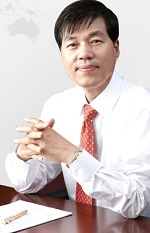 |
| Samsung BioLogics CEO Tae Han Kim |
Samsung Group's pharmaceutical division appears to be betting the farm on a plan to be the go-to guy when it comes to actually making biosimilar drugs, eschewing contract research and becoming the leading contract manufacturer of them.
The South Korea conglomerate better known for its high-tech gadgets is betting that its biotech units, such as Samsung BioLogics and Samsung Bioepis, will lead that drive, the former making drugs for other companies, the latter versions of innovative drugs going off-patent.
In an interview with the Wall Street Journal, BioLogics CEO Tae Han Kim said biotechnology was the best sector to meet the parent company's demand that a venture into a new area of business be able to do a better job in its field in at least the first 10 years than its competitors.
He said he had doubts his division could beat other companies in biologics discovery, developing, marketing and sales, but he was confident it could in contract manufacturing given the firm's history of designing and building high-quality production facilities, such as in the semiconductor field.
Within four years and $2.74 billion spent, Samsung had built and opened a plant capable of producing 30,000 liters, in nearly half the 7 years it usually takes in the industry. Another plant with 7 times that capacity, making it the world's largest, is nearly complete.
Since entering the business nearly three years ago, Samsung BioLogics was able to sign long-term biosimilar manufacturing contracts with Bristol-Myers Squibb ($BMY) and Roche ($RHBBY). It also has commitments from three or four other companies.
Samsung Bioepis is in the process of getting regulatory approval for making its own biosimilar versions of biologics with expiring patents. The global biologics market is expected to be worth $278 billion in 2020, an increase of nearly $100 billion over the next 5 years.
With that work in place, Kim expects to see "pretty big revenues" and operating income as soon as the huge plant comes on line as is expected next year. A third plant is set to be completed by early 2019, but by then, the BioLogics CEO said, he expects the firm to have more capacity than any contract drug manufacturer in the world.
Much of the long-term projects, the Wall Street Journal said, may depend on 47-year-old Lee Jae-yong, heir apparent to head Samsung Group, now led by his father, Chairman Lee Kun-hee, who was incapacitated by a heart attack. The younger Lee is vice chairman of Samsung Electronics.
With a huge manufacturing capacity in place, Samsung BioLogics also is considering whether to launch an initial public offering and add a fourth or fifth plant. As for drug discovery in the biologics sector, that might be in the cards for Samsung as early as 10 years from now, Kim said.
- here's the WSJ story on Samsung's Lee Jae-yong (sub. req.)
- and a WSJ Q&A with Samsung BioLogic's Tae Han Kim (sub. req.)